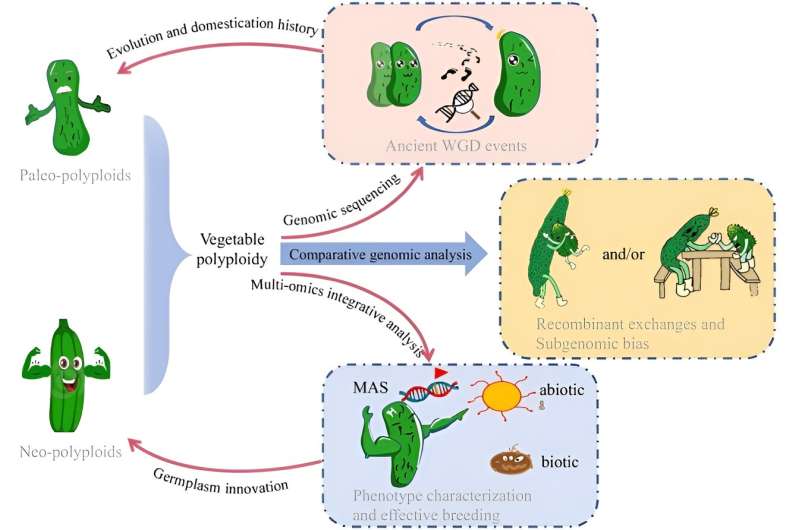
A research team has elucidated the role of polyploidy in the evolution and breeding of vegetable crops, leveraging advanced sequencing technologies to dissect the genetic and epigenetic nuances of polyploids. Their findings underline the critical contribution of polyploidy to plant diversity and adaptability, shedding light on “Darwin’s abominable mystery” of angiosperm expansion.
Highlighting polyploidy’s potential to enhance crop yields and qualities, the review advocates for its application in vegetable breeding for economic and dietary benefits. Despite the strides in sequencing and multi-omics analysis, challenges persist, including understanding polyploidization’s comprehensive impact and leveraging technology for non-model crops.
The study calls for increased research into minor vegetable crops, emphasizing the importance of polyploidy in meeting global food security challenges and promoting a healthy diet amid rising health concerns over high-calorie foods.
Vegetables, crucial for human health and increasingly important economically, are often polyploids, which contribute to their larger organ size and enhanced environmental adaptability. This trait, prevalent in key crops like wheat and cotton, offers significant advantages for breeding, including unique flavors and wider adaptation.
Utilization of advanced sequencing technologies have vastly improved our understanding of vegetable genomics, particularly polyploids, enabling detailed investigations into their evolutionary history and genetic diversity.
Despite these advancements, challenges persist in accurately assembling the complex genomes of polyploids due to their sequence similarity, hindering deeper molecular insights. The current research landscape is poised to further explore the phenotypic advantages and molecular mechanisms of polyploids to untangle the complexities of their genomes, thereby promoting vegetable germplasm innovation and breeding utilization.
A study published in Vegetable Research offers a comprehensive overview of research on vegetable polyploids facilitated by high-throughput sequencing that enhances our grasp of plant evolution and aids in the effective breeding of vegetables through polyploidy.
Genomic sequencing has revolutionized the understanding of vegetable evolution by uncovering ancient whole genome duplication (WGD) events, pivotal for crop domestication and breeding.
Through high-quality genome assemblies, researchers have mapped conserved homologous regions and identified orthologous genes across Cucumis species, revealing the ancient Cucurbit-Common Tetraploidization (CCT) event, which is critical for the divergence of Cucurbitaceae plants.
Despite this, many Cucurbitaceae crops retain genetic information from their diploid progenitors, displaying genetic stability unusual in polyploid evolution. The study of Chinese cabbage and Allium sativum has further highlighted how WGD events contribute to genome expansion and diversification.
Polyploids have complex genomes which make their assembly challenging due to the limitations of sequencing. Recent advances in long-read sequencing have improved the ability to analyze polyploid genomes, revealing structural variants and facilitating the assembly of complex genomes like tetraploid potatoes.
Allopolyploidy arises from the merging of distinct genomes and results in notable changes in gene structure and expression. These changes are gradually stabilized through diploidization, which facilitates species’ adaptation to new environments.
This review underscores the potential of polyploidy in enhancing crop diversity and adaptability, essential for addressing global food security. Comparative genomic analyses have shown different fates of polyploid subgenomes, with some becoming dominant, affecting gene expression and agricultural value.
Integrative multi-omics analyses are now enabling efficient crop breeding, offering insights into the complex phenotypes of polyploid vegetables and paving the way for germplasm enhancement through polyploidy.
According to the study’s senior researcher, Prof. Xiaqing Yu, “This review summarizes the research progress in vegetable polyploids driven by sequencing technology and the subsequent studies underpinning important traits and genes, which will further promote germplasm innovation and breeding utilization via polyploidy in vegetables.”
This work underscores the need for further research, particularly in non-model vegetable crops, to leverage polyploidy for agricultural innovation and to meet the demands of global food security and dietary health.
This calls for more affordable advanced technologies and a greater focus on diversifying vegetable germplasm for a healthier diet, pointing towards a promising direction for polyploidy-based crop breeding aided by artificial intelligence.
More information:
Weixuan Du et al, How high-throughput sequencing empowers the research of polyploidy in vegetable crops, Vegetable Research (2024). DOI: 10.48130/vegres-0024-0005
Citation:
Polyploidy in vegetables: Exploring genetics for crop evolution and breeding success (2024, April 16)
retrieved 16 April 2024
from https://phys.org/news/2024-04-polyploidy-vegetables-exploring-genetics-crop.html
This document is subject to copyright. Apart from any fair dealing for the purpose of private study or research, no
part may be reproduced without the written permission. The content is provided for information purposes only.







